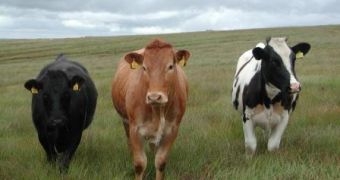By now, several studies have shown that the fracking industry must be held accountable for considerable damage done to the environment.
Still, veterinarian Michelle Bamberger and professor Robert Oswald have recently decided to look into how the practice of hydraulic fracturing impacts on livestock.
Thus, they have interviewed 24 farmers living and going about their business in six American states where the fracking industry is very much developed and found that, throughout the years, some of their animals displayed signs of neurological, reproductive and gastrointestinal problems.
The Food and Environment Reporting Network explains that all of the animals taken into consideration for this study fell ill with said conditions following their being exposed to dangerous doses of chemical compounds the fracking industry more often than not releases into the environment.
“They [the livestock] live in areas that have tested positive for air, water and soil contamination. Some of these chemicals could appear in milk and meat products made from these animals,” Michelle Bamberger commented with respect to these findings.
“There are a variety of organic compounds, metals and radioactive material (released in the fracking process) that are of human health concern when livestock meat or milk is ingested. These compounds accumulate in the fat and are excreted into milk. Some compounds are persistent and do not get metabolized easily,” veterinary toxicologist Motoko Mukai went on to add.
Still, the report was dismissed by the people who support the fracking industry.
The two major complaints they brought forth had to do with the fact that the farmers interviewed for this study remained unnamed, and with the fact that no “serious” laboratory tests had been carried out to pin down exactly what chemical compound affected what animal in each of said manners.
As well as this, it was argued that, when compared to how many animals are raised in the US on a yearly basis in order to provide for the food industry, having a few cattle die now and then hardly makes a noteworthy difference.
On the other hand, fracking opponents wish to draw attention to the fact that the deaths of these animals must be regarded as an early warning, and that the energy industry worldwide would do best to green up its working agenda as soon as possible.

 14 DAY TRIAL //
14 DAY TRIAL //